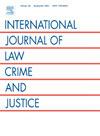Discouraging dignity: Linguistic barriers to transforming the prison environment
IF 1.4
4区 社会学
Q3 CRIMINOLOGY & PENOLOGY
International Journal of Law Crime and Justice
Pub Date : 2025-05-29
DOI:10.1016/j.ijlcj.2025.100755
引用次数: 0
Abstract
There has been a recent push towards person-first language to describe people detained in the carceral system. This paper widens that lens, focusing on the language used to describe individuals who work in the system, specifically those perceived as pursuing too much dignity for incarcerated people. The paper revolves around a qualitative analysis of data from semi-structured interviews with 14 DOC employees involved in a prison reform project. By semantically analyzing variations in language meaning and purpose, the study finds that reform-minded correctional officers differentiate how they talk to and about incarcerated people. Also salient is that prison staff can be subject to language-based stigma if they are perceived as too sympathetic to incarcerated people. Specifically, the terms “inmate-lover” and “hug-a-thug” are pejorative and are employed by other correctional officers to undermine reform-oriented colleagues. We explore the various definitions and meanings of these terms and contemplate their policy significance.
打击尊严:改变监狱环境的语言障碍
最近出现了一种以人为本的语言,用来描述拘留系统中被拘留的人。本文扩大了这一视角,重点关注用于描述在系统中工作的个人的语言,特别是那些被认为为被监禁的人追求太多尊严的人。本文围绕着对参与监狱改革项目的14名DOC员工进行半结构化访谈的数据进行定性分析。通过对语言意义和目的的语义分析,该研究发现,具有改革意识的惩教人员在与囚犯交谈和谈论囚犯时,会有所区别。同样突出的是,如果监狱工作人员被认为过于同情被监禁的人,他们可能会受到基于语言的羞辱。具体来说,“囚犯爱人”和“拥抱暴徒”这两个词带有贬义,被其他惩教官员用来诋毁那些致力于改革的同事。我们探讨了这些术语的各种定义和含义,并思考了它们的政策意义。
本文章由计算机程序翻译,如有差异,请以英文原文为准。
求助全文
约1分钟内获得全文
求助全文
来源期刊
CiteScore
2.70
自引率
0.00%
发文量
25
审稿时长
47 days
期刊介绍:
The International Journal of Law, Crime and Justice is an international and fully peer reviewed journal which welcomes high quality, theoretically informed papers on a wide range of fields linked to criminological research and analysis. It invites submissions relating to: Studies of crime and interpretations of forms and dimensions of criminality; Analyses of criminological debates and contested theoretical frameworks of criminological analysis; Research and analysis of criminal justice and penal policy and practices; Research and analysis of policing policies and policing forms and practices. We particularly welcome submissions relating to more recent and emerging areas of criminological enquiry including cyber-enabled crime, fraud-related crime, terrorism and hate crime.

 求助内容:
求助内容: 应助结果提醒方式:
应助结果提醒方式:


